
A Doll's House is a three-act play written by Norwegian playwright Henrik Ibsen. It premiered at the Royal Danish Theatre in Copenhagen, Denmark, on 21 December 1879, having been published earlier that month. The play is set in a Norwegian town c. 1879.

Dame Alice Ellen Terry was a leading English actress of the late 19th and early 20th centuries.

Ghosts is a play by the Norwegian playwright Henrik Ibsen. It was written in Danish and published in 1881, and first staged in 1882 in Chicago, Illinois, US, performed in Danish.

Gabrielle Réjane, néeGabrielle Charlotte Réju, was a French actress of the late 19th and early 20th centuries.
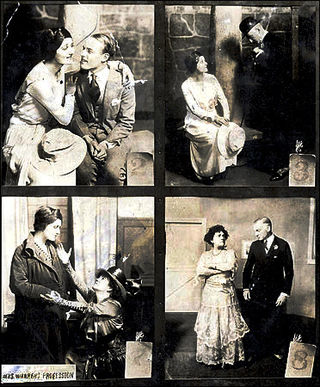
Mrs. Warren's Profession is a play written by George Bernard Shaw in 1893, and first performed in London in 1902. It is one of the three plays Shaw published as Plays Unpleasant in 1898, alongside The Philanderer and Widowers' Houses. The play is about a former prostitute, now a madam, who attempts to come to terms with her disapproving daughter. It is a problem play, offering social commentary to illustrate the idea that the act of prostitution was not caused by moral failure but by economic necessity. Elements of the play were borrowed from Shaw's 1882 novel Cashel Byron's Profession, about a man who becomes a boxer due to limited employment opportunities.
Cheryl Campbell is an English actress of stage, film and television. She starred opposite Bob Hoskins in the 1978 BBC drama Pennies From Heaven, before going on to win the 1980 BAFTA TV Award for Best Actress for Testament of Youth and Malice Aforethought, and the 1982 Olivier Award for Best Actress in a Revival for A Doll's House. Her film appearances include Chariots of Fire (1981), Greystoke: The Legend of Tarzan, Lord of the Apes (1984) and The Shooting Party (1985).
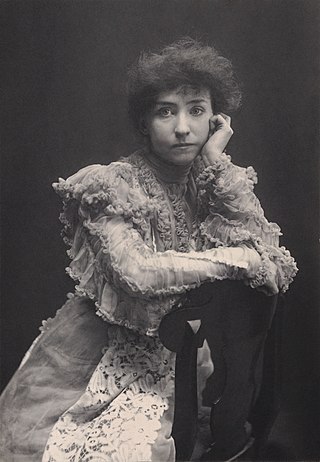
Minnie Maddern Fiske, but often billed simply as Mrs. Fiske, was one of the leading American actresses of the late 19th and early 20th century. She also spearheaded the fight against the Theatrical Syndicate for the sake of artistic freedom. She was widely considered the most important actress on the American stage in the first quarter of the 20th century. Her performances in several Henrik Ibsen plays helped introduce American audiences to the Norwegian playwright.

Dame Irene Vanbrugh DBE was an English actress. The daughter of a clergyman, Vanbrugh followed her elder sister Violet into the theatrical profession and sustained a career for more than 50 years.
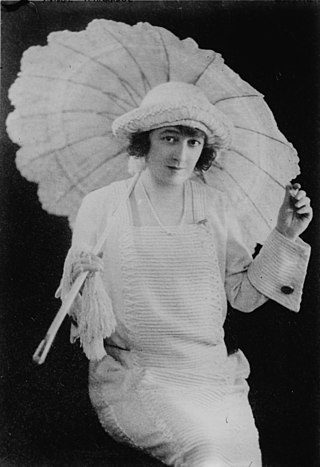
Madge Titheradge was an Australian-born actress who became a leading actress in the West End of London and on Broadway.

Gerda Carola Cecilia Lundequist was a Swedish stage actress, an Ibsen and Strindberg-thespian that in her time was known throughout Scandinavia as "The Swedish Sarah Bernhardt".

Margaret Rawlings, Lady Barlow was an English stage actress, born in Osaka, Japan, daughter of the Rev. George William Rawlings and his wife Lilian Rawlings.
The Independent Theatre Society was a by-subscription-only organisation in London from 1891 to 1897, founded by Dutch drama critic Jacob Grein to give "special performances of plays which have a literary and artistic rather than a commercial value." The society was inspired by its continental forerunners, the Théâtre-Libre and Die Freie Bühne. The Society produced modern realist plays, mostly by continental European playwrights, on the London stage.

Johanne Dybwad was a Norwegian stage actress and stage producer. She was the leading actress in Norwegian theatre for half a century.
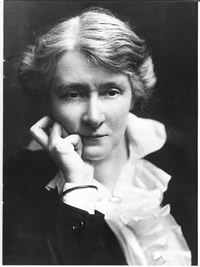
Edith Ailsa Geraldine Craig, known as Edy Craig, was a prolific theatre director, producer, costume designer and early pioneer of the women's suffrage movement in England. She was the daughter of actress Ellen Terry and the progressive English architect-designer Edward William Godwin, and the sister of theatre practitioner Edward Gordon Craig.

Dorothy Minto was a prominent actress on the London stage between 1905 and the mid-1930s, notably appearing in the first runs of several plays written by George Bernard Shaw. She also featured in a small number of films between 1916 and 1936. While her early stage career concentrated on classical plays and serious new work, from 1912 onwards she devoted herself more to musicals and comedies.
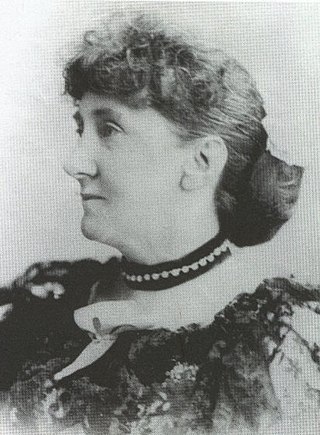
Sarah Thorne was a British actress and actress-manager of the 19th century who managed the Theatre Royal at Margate for many years. She ran a school for acting there which is widely regarded as Britain's first formal drama school. The Sarah Thorne Theatre Club in Broadstairs is named in her memory.

Gertrude Kingston was an actress, an English actor-manager and artist.

Nora Nicholson was an English actress. Known for her portrayal of character roles, she achieved her greatest success in the later years of her career. She played in classics by Shakespeare and Chekhov and in new plays by authors including Noël Coward and Alan Bennett. Many of her best-regarded performances were as eccentric or even unhinged characters.
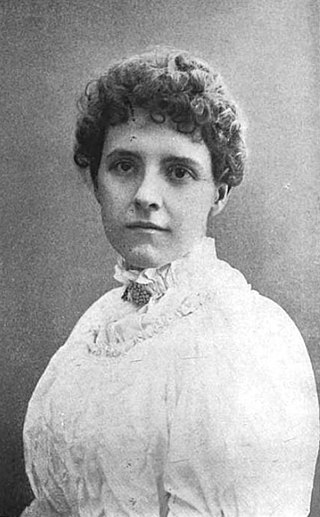
Beatrice Cameron was an American stage actress. She was the leading lady for the company of actor Richard Mansfield, whom she married in 1892. She retired from acting in 1898.
Charles Charrington Martin, often known as Charles Charrington, but at times as Charles Martin, was a British actor and barrister.


















